
Journal Menu
► ▼ Journal Menu-
- Batteries Home
- Aims & Scope
- Editorial Board
- Reviewer Board
- Topical Advisory Panel
- Instructions for Authors
- Special Issues
- Topics
- Sections & Collections
- Article Processing Charge
- Indexing & Archiving
- Editor’s Choice Articles
- Most Cited & Viewed
- Journal Statistics
- Journal History
- Journal Awards
- Society Collaborations
- Editorial Office
- 10th Anniversary
Journal Browser
► ▼ Journal BrowserNeed Help?
Announcements
26 June 2025
14 MDPI Journals Celebrate a Decade of Scholarly Publishing
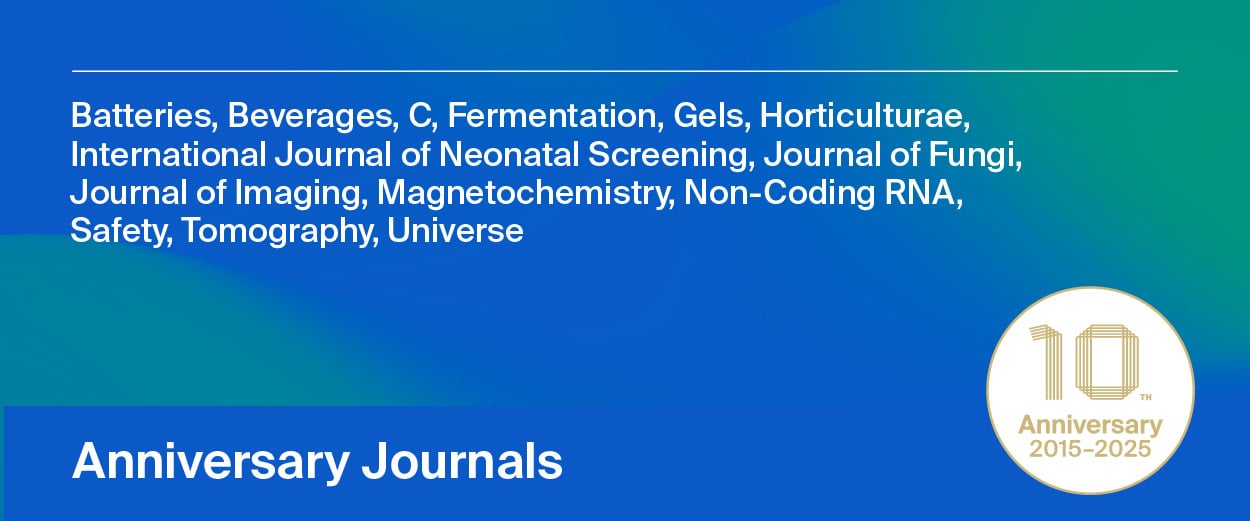
In the year 2025, we are thrilled to share that 14 academic journals are celebrating their 10th anniversary of establishment.
To commemorate this milestone, each journal has launched a dedicated online anniversary webpage to review academic achievements, envision future directions, and express heartfelt gratitude to all contributors—authors, reviewers, editorial board members, and supporters—who have played a pivotal role in the journals’ growth. It is through your dedication and outstanding contributions that these journals have grown and developed into influential platforms for global scholarly exchange.

Over the past decade, these journals have remained committed to the principles of open science, delivering exceptional value within their respective fields.
Key highlights include:
- Universe—A cornerstone for fundamental and applied physics research, spanning near-Earth space to cosmic phenomena;
- Batteries—Focuses on the latest research achievements in batteries and closely related disciplines, effectively connecting academic research with industrial practice;
- Magnetochemistry—Over 1,000 high-impact papers published, attracting worldwide attention in magnetic research;
- Non-Coding RNA—Evolved from an open-access pioneer to a leading platform in non-coding RNA studies;
- Safety—Emerged as a vital interdisciplinary platform dedicated to addressing global challenges in safety science, risk management, and injury prevention;
- Tomography—Provided early career scholars with valuable editorial experience and academic support, fostering their professional growth in medical imaging;
- Fermentation—Took microbial fermentation engineering as the core, promoting the leap of biomanufacturing from the laboratory to industrialization;
- Gels—Recorded the revolutionary breakthroughs of gel materials from basic research to intelligent applications;
- Journal of Imaging—Pioneering intelligent imaging technology to redefine the horizons of scientific discovery;
- International Journal of Neonatal Screening—Dedicated to the rapid publication and knowledge sharing of newborn screening research;
- C — Journal of Carbon Research—Explored the infinite possibilities of carbon science;
- Journal of Fungi—Revealed the mysteries of fungal science, from fundamental research to global public health applications;
- Beverages—Reshaped the beverage industry with technology, from flavor innovation to the upgrade of healthy consumption;
- Horticulturae—Restoring the symbiotic bond between humans and nature through innovative green technology.

|
Journal |
Editor-in-Chief |
|
|
Prof. Dr. Andreas Jossen |
|
|
Prof. Dr. Edgar Chambers IV |
|
|
Prof. Dr. Craig E. Banks |
|
|
Dr. Badal C. Saha |
|
|
Prof. Dr. David Díaz Díaz |
|
|
Prof. Dr. Douglas D. Archbold |
|
|
Dr. Ralph Fingerhut Dr. Peter C. J. I. Schielen |
|
|
Prof. Dr. David S. Perlin |
|
|
Prof. Dr. Gonzalo Pajares |
|
|
Prof. Dr. Carlos J. Gómez García |
|
|
Prof. Dr. George A. Calin |
|
|
Prof. Dr. Raphael Grzebieta |
|
|
Prof. Dr. Emilio Quaia |
|
|
Prof. Dr. Lorenzo Iorio |
As we embark on the next stage of our journey, we remain dedicated to upholding the highest standards of academic excellence and fostering a vibrant academic community.
We extend our deepest gratitude to everyone who has supported MDPI. Moving forward, we are committed to advancing open science, enhancing publishing services, and fostering the transformation of research outcomes. Together, let us continue to drive academic progress and global scholarly collaboration.
25 June 2025
Batteries Receives an Updated Impact Factor of 4.8
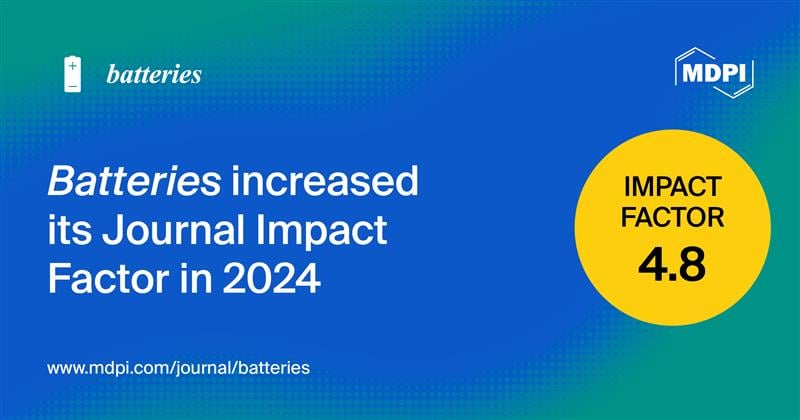
We are pleased to share that Batteries (ISSN: 2313-0105) was awarded an increased Impact Factor of 4.8 in the 2024 Journal Citation Reports™ released by Clarivate™ in June 2025. The journal ranks as follows:
- Q2 (12th out of 44 titles) in the “Electrochemistry” category;
- Q2 (84th out of 182 titles) in the “Energy and Fuels” category;
- Q2 (148th out of 460 titles) in the “Materials Science, Multidisciplinary” category.
The 2024 Journal Impact Factor is calculated by dividing the number of citations received in 2024 for all publications in the journal from 2022 and 2023 by the total number of citable publications from those same years.
For further statistics, please visit our journal statistics website. For more information about MDPI flagship journals’ citation metrics, please see here.
The support and dedication of all the editors, reviewers, authors, and readers are integral to the journal’s success. We would like to take this opportunity to thank everyone who has contributed to the journal.
Batteries Editorial Office
20 June 2025
Young Women in Engineering Award—Open for Nominations
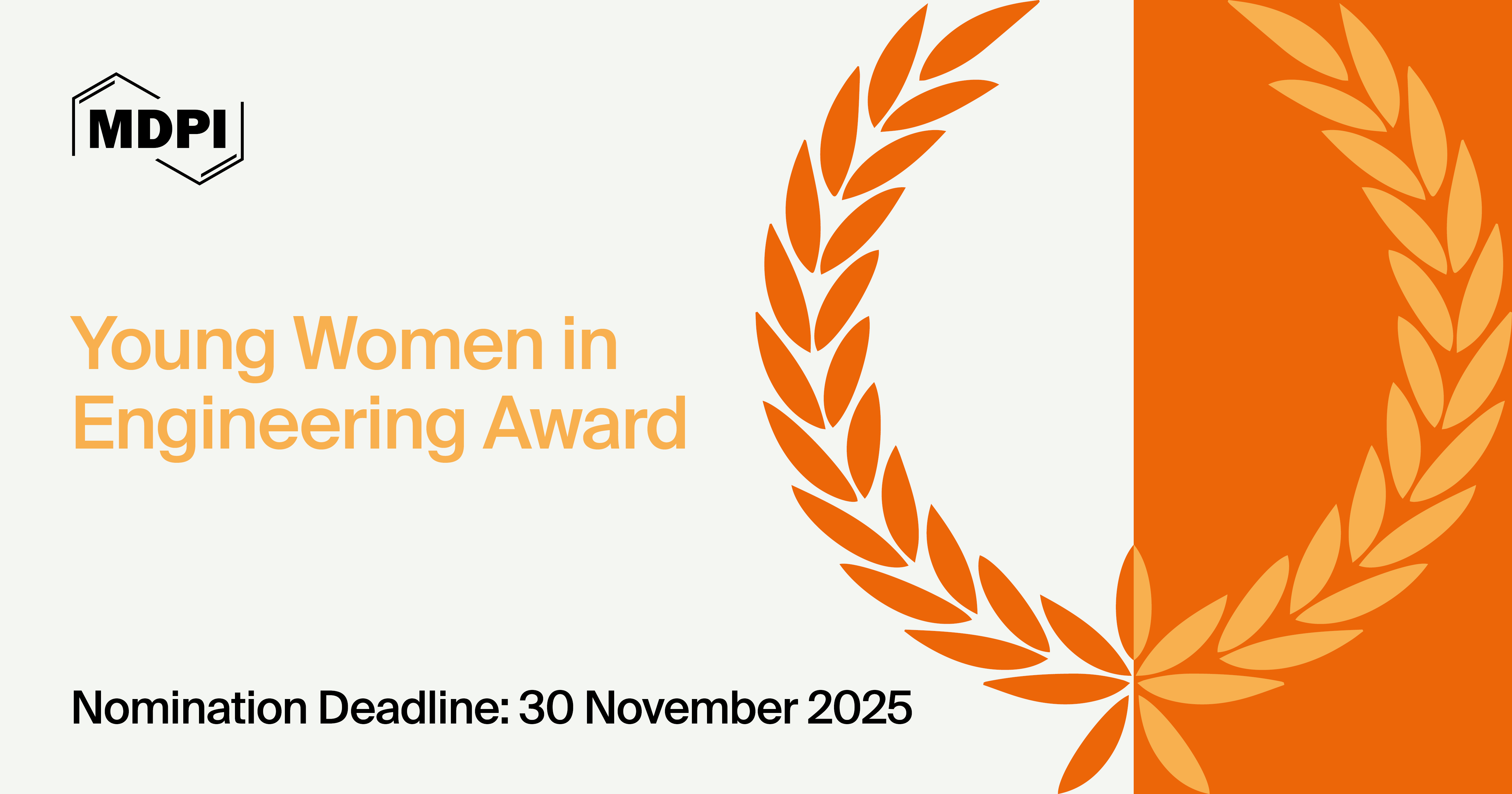
We are pleased to announce that the Young Women in Engineering Award is open for nominations. This award was established to acknowledge the achievements of young women investigators in the field of engineering and to inspire young women to consider research and careers in engineering. All the nominations will be assessed by an Award Evaluation Committee, and winners will be announced online on 8 March 2026.
Prizes:
- CHF 1000;
- An electronic certificate;
- A voucher to waive the article processing charges (APCs) for one submission to a journal within the field of engineering (subject to peer review)—valid for one year.
Number of winners: 2.
Eligibility and requirements:
- This role is designated for female candidates;
- Must have received their Ph.D. no more than 10 years prior to 31 December 2025;
- Must have produced groundbreaking research and made a significant contribution to the advancement of engineering;
- Must be nominated by senior scientists.
List of documents for nomination:
- Detailed curriculum vitae, including an updated publication list and a list of the researcher’s own research grants;
- Scanned copy of doctorate certificate;
- Signed nomination letters from two established senior scientists.
Schedule:
Open for nominations: 23 June 2025;
Nomination deadline: 30 November 2025;
Winner announcement: 8 March 2026.
Nominations and contact:
All nomination materials and award-related communications must be submitted via our official email: ywe-award@mdpi.com.
Please do not hesitate to contact us if you have any questions. We look forward to receiving your nominations.
Young Women in Engineering Award Team
13 June 2025
Batteries Receives an Increased CiteScore of 6.6 and an Improved Category Ranking
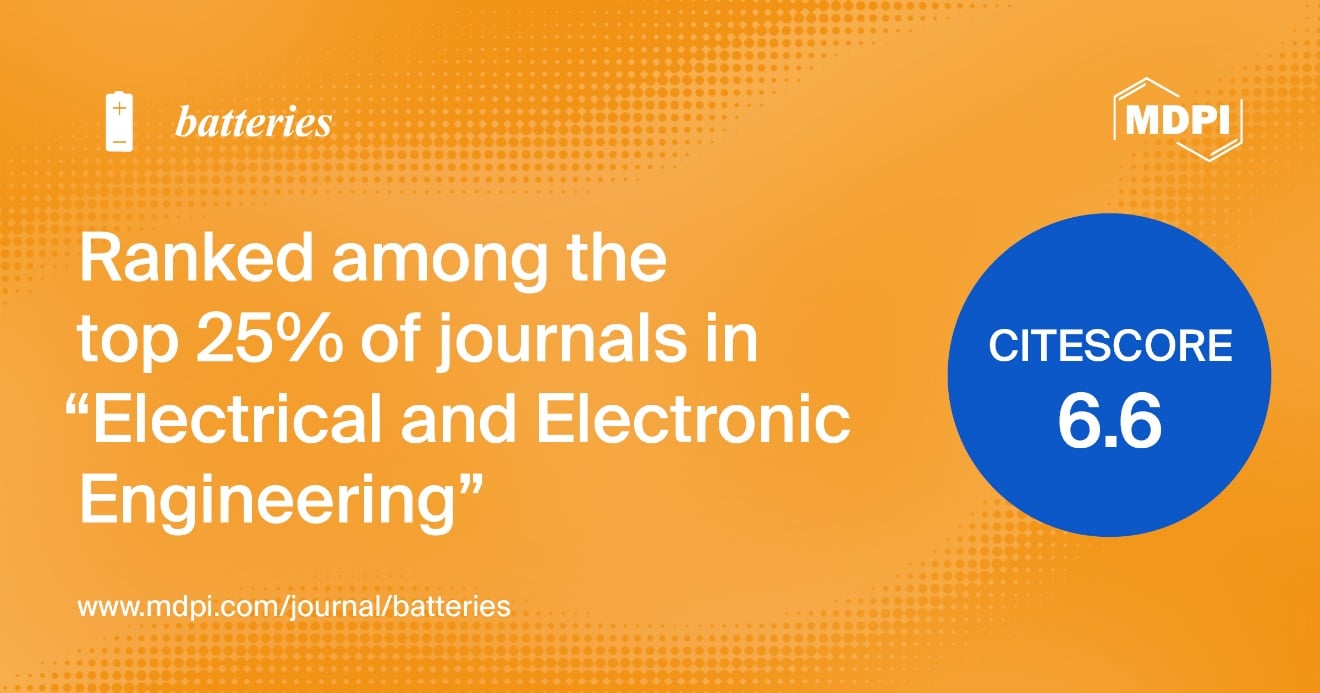
We are pleased to announce that Batteries (ISSN: 2313-0105) received an increased CiteScore of 6.6 in June 2025, which is an impressive achievement, with the following ranks:
- Q1 (204th out of 970, improvement) in the “Electrical and Electronic Engineering” category;
- Q2 (79th out of 299, improvement) in the “Energy Engineering and Power Technology” category;
- Q2 (27th out of 64, improvement) in the “Electrochemistry” category;
For more journal statistics, please visit the following websites:
The current CiteScores measure the average number of citations of a journal over a four-year window (2021–2024). The Scopus database provides a comprehensive suite of metrics that support informed publishing strategies and research evaluation and enable the benchmarking of journal performance.
This achievement reflects the collective efforts of our authors, reviewers, editors, and readers. Together, we will continue to track the progress of Batteries and its growing impact in the energy field.
Thank you to all those who have contributed to the journal.
Batteries Editorial Office
10 June 2025
Scientific Publishing Exchange at CNR-STEMS, Naples, Italy, Held in May 2025
In May 2025, Batteries (ISSN: 2313-0105) co-hosted a scientific publishing exchange event at the Consiglio Nazionale delle Ricerche—Istituto per lo Studio dei Materiali per l'Energia e le Tecnologie Sostenibili (CNR-STEMS) in Naples, Italy. The event was organized in collaboration with Dr. Ottorino Veneri, a senior researcher at CNR-STEMS, and Dr. Bianca Maria Vaglieco, the Director of CNR-STEMS. Focused on advancing scholarly communication, the program featured insights into MDPI’s open access publishing model, practical guidance on scientific article writing, and strategies for crafting effective review reports.
Participants engaged in discussions on the multifaceted advantages of open access, including enhanced visibility, broader accessibility of research outputs, and alignment with global academic impact goals. The workshop also delved into structural best practices for manuscripts—such as optimizing clarity, adhering to international journal standards, and refining narrative flow. A key highlight was the dual-perspective session on peer review, which addressed both the professional techniques for writing constructive review reports and the strategies authors can employ to respond effectively to reviewer feedback.
Journal Relations Specialist Mr. Cosmin-Iulian Artan facilitated an interactive Q&A session, encouraging participants to share their experiences with Batteries (ISSN: 2313-0105) and other MDPI journals. This dialog fostered a collaborative environment for exchanging insights on publishing workflows and editorial expectations.
Committed to supporting the academic community, Batteries looks forward to organizing future events that empower researchers at every stage of their publishing journey, reinforcing its role as a bridge between innovative scholarship and global scientific discourse.
|
|
|
|
|
|
|
3 June 2025
Batteries Best Paper Award—Winners Announced
We are pleased to announce the winners of the Batteries 2023 Best Paper Award. All papers published from 1 January to 31 December 2023, in Batteries (ISSN: 2313-0105) were considered for the award. After a thorough evaluation by the Award Committee of the Editorial Board, based on the originality and significance of the papers, citations, and downloads, five winners were selected.
First Prize: CHF 500 and a paper published for free in Batteries
Article:
“State of Charge and Temperature Joint Estimation Based on Ultrasonic Reflection Waves for Lithium-Ion Battery Applications”
by Runnan Zhang, Xiaoyu Li, Chuanyu Sun, Songyuan Yang, Yong Tian and Jindong Tian
Batteries 2023, 9(6), 335; https://doi.org/10.3390/batteries9060335
Available online: https://www.mdpi.com/2313-0105/9/6/335
Second Prize: CHF 200 and a paper published for free in Batteries
Article:
“Design, Properties, and Manufacturing of Cylindrical Li-Ion Battery Cells—A Generic Overview”
by Sabri Baazouzi, Niklas Feistel, Johannes Wanner, Inga Landwehr, Alexander Fill and Kai Peter Birke
Batteries 2023, 9(6), 309; https://doi.org/10.3390/batteries9060309
Available online: https://www.mdpi.com/2313-0105/9/6/309
Review:
“Battery State of Health Estimate Strategies: From Data Analysis to End-Cloud Collaborative Framework”
by Kaiyi Yang, Lisheng Zhang, Zhengjie Zhang, Hanqing Yu, Wentao Wang, Mengzheng Ouyang, Cheng Zhang, Qi Sun, Xiaoyu Yan, Shichun Yang and Xinhua Liu
Batteries 2023, 9(7), 351; https://doi.org/10.3390/batteries9070351
Available online: https://www.mdpi.com/2313-0105/9/7/351
Third Prize: 100 CHF and a paper published for free in Batteries
Article:
“Trends in Automotive Battery Cell Design: A Statistical Analysis of Empirical Data”
by Steffen Link, Christoph Neef and Tim Wicke
Batteries 2023, 9(5), 261; https://doi.org/10.3390/batteries9050261
Available online: https://www.mdpi.com/2313-0105/9/5/261
Review:
“Challenges and Future Prospects of the MXene-Based Materials for Energy Storage Applications”
by Svitlana Nahirniak, Apurba Ray and Bilge Saruhan
Batteries 2023, 9(2), 126; https://doi.org/10.3390/batteries9020126
Available online: https://www.mdpi.com/2313-0105/9/2/126
Please join us in congratulating the winners of the Batteries 2023 Best Paper Award. We would also like to take this opportunity to thank all our authors for their continued support.
Batteries Editorial Office
3 June 2025
World Environment Day—“Beat Plastic Pollution”, 5 June 2025
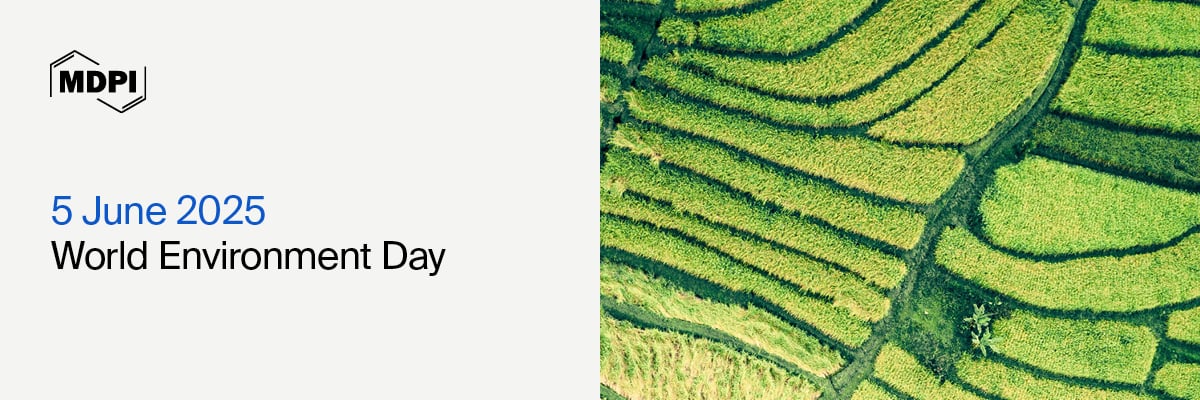
World Environment Day is an urgent call to action as nature suffers from the devastating impacts of human activity. Annual plastic production exceeds 400 million tons, half of which is single-use plastic, with under 10% recycled. 11 million tons of plastic (equal to 2,200 Eiffel Towers) pollute waterways yearly. Microplastics contaminate our food, water, and air, with humans ingesting over 50,000 particles annually. This pollution harms health and ecosystems globally. A solution does exist, however. Governments, businesses, and individuals must adhere to the 5Rs—Refuse, Reduce, Reuse, Recycle, and Rethink. Join #BeatPlasticPollution this World Environment Day to create a sustainable future.
On this significant day, we are proud to present a curated collection of articles and initiatives dedicated to groundbreaking research and innovative solutions for protecting the environment and beating plastic pollution. We invite readers to explore these resources and join us in our shared mission of a sustainable vision of the future. Together, we can pave the way for a cleaner, healthier planet.

|
Environmental & Earth Sciences |
Biology & Life Sciences Chemistry & Materials Science |
Social Sciences, Arts and Humanities Engineering |

“Enhanced Separation of Palladium from Nuclear Wastewater by the Sulfur-Rich Functionalized Covalent Organic Framework”
by Junli Wang, Chen Luo, Wentao Wang, Hui Wang, Yao Liu, Jianwei Li and Taihong Yan
Nanomaterials 2025, 15(10), 714; https://doi.org/10.3390/nano15100714
“Prevention of Biofouling Due to Water Absorption of Natural Fiber Composites in the Aquatic Environment: A Critical Review”
by Cristiano Fragassa, Sara Mattiello, Martina Fronduti, Jo’ Del Gobbo, Radmila Gagic and Carlo Santulli
J. Compos. Sci. 2024, 8(12), 532; https://doi.org/10.3390/jcs8120532
“Testing the Effectiveness of an Ecomedia Literacy Environmental Education Lesson”
by Ludovica Lo Iacono, Ludovica Lo Iacono and Emilio Paolo Visintin
Soc. Sci. 2024, 13(12), 645; https://doi.org/10.3390/socsci13120645
“Airborne Microplastics: Challenges, Prospects, and Experimental Approaches”
by Alexey R. Rednikin, Yulia A. Frank, Artem O. Rozhin, Danil S. Vorobiev and Rawil F. Fakhrullin
Atmosphere 2024, 15(11), 1380; https://doi.org/10.3390/atmos15111380
“Emerging Technologies for Remote Sensing of Floating and Submerged Plastic Litter”
by Lonneke Goddijn-Murphy, Victor Martínez-Vicente, Heidi M. Dierssen, Valentina Raimondi, Erio Gandini, Robert Foster and Ved Chirayath
Remote Sens. 2024, 16(10), 1770; https://doi.org/10.3390/rs16101770
“The Other Side of Fire in a Changing Environment: Evidence from a Mediterranean Country”
by Dimitrios Kalfas, Stavros Kalogiannidis, Fotios Chatzitheodoridis and Nikolaos Margaritis
Fire 2024, 7(2), 36; https://doi.org/10.3390/fire7020036
“A Review of Lithium-Ion Battery Recycling: Technologies, Sustainability, and Open Issues”
by Alessandra Zanoletti, Eleonora Carena, Chiara Ferrara and Elza Bontempi
Batteries 2024, 10(1), 38; https://doi.org/10.3390/batteries10010038
“A Comparative Analysis of Different Hydrogen Production Methods and Their Environmental Impact”
by Somtochukwu Godfrey Nnabuife, Caleb Kwasi Darko, Precious Chineze Obiako, Boyu Kuang, Xiaoxiao Sun and Karl Jenkins
Clean Technol. 2023, 5(4), 1344-1380; https://doi.org/10.3390/cleantechnol5040067
“Screening of Microplastics in Aquaculture Systems (Fish, Mussel, and Water Samples) by FTIR, Scanning Electron Microscopy–Energy Dispersive Spectroscopy and Micro-Raman Spectroscopies”
by Kleopatra Miserli, Christos Lykos, Angelos G. Kalampounias and Ioannis Konstantinou
Appl. Sci. 2023, 13(17), 9705; https://doi.org/10.3390/app13179705
“Microplastics, Additives, and Plasticizers in Freshwater Bivalves: Preliminary Research of Biomonitoring”
by Giulia Cesarini, Fabiana Corami, Beatrice Rosso and Massimiliano Scalici
Water 2023, 15(14), 2647; https://doi.org/10.3390/w15142647

|
Guest Editors: Dr. Ramona Riedel and Prof. Dr. Giulio Malucelli Submission deadline: 20 August 2025 |
“Novel Sources, Designs and After-Use Pathways for Plastics in a Circular Economy” Guest Editor: Dr. María José Arévalo-Caballero Submission deadline: 31 August 2025 |
 |
 |
|
“Airborne Micro and Nanoplastics: Detection, Dynamics, and Exposure Assessment” Guest Editor: Dr. Yangyang Liu Submission deadline: 30 September 2025 |
“Aquatic Microplastic Pollution: Occurrence and Removal” Guest Editor: Dr. Lixin Zhu Submission deadline: 25 October 2025 |
 |
 |
|
“Innovative Strategies to Mitigate the Impact of Mining” Topic Editors: Prof. Dr. Chongchong Qi, Dr. Qiusong Chen and Dr. Danial Jahed Armaghani Submission deadline: 31 October 2025 |
“Enabling Strategies and Policies Toward a Sustainable Environment, 2nd Edition” Topic Editors: Dr. Abdul Majeed, Prof. Dr. Yuantao Xie and Prof. Dr. Judit Oláh Submission deadline: 31 October 2025 |
 |
 |

 |
 |
 |
3 June 2025
MDPI INSIGHTS: The CEO's Letter #23 - MDPI Summits Spain & Italy, Ei Compendex, and Editorial Independence

Welcome to the MDPI Insights: The CEO's Letter.
In these monthly letters, I will showcase two key aspects of our work at MDPI: our commitment to empowering researchers and our determination to facilitating open scientific exchange.
Opening Thoughts

Highlights from the MDPI Spain Summit in Barcelona (21-22 May)
In May we hosted the MDPI Spain Summit in Barcelona – our second summit in the city following the inaugural one in November 2023.

Stefan Tochev (CEO, MDPI) at the MDPI Spain Summit in Barcelona, 22 May 2025.
Creating a space for exchange of views
The goal of our summits is to bring together Chief Editors of MDPI journals from across disciplines and institutions. These intimate gatherings provide a platform to present the latest developments at MDPI and to initiate open conversations about our journals, the future of open access, and the evolving landscape of scientific publishing.
Most importantly, these are opportunities for in-person connection, providing a more meaningful space for the exchange of views and for building long-term relationships.
Exploring the future of scientific publishing in Spain
The summit took place on 21–22 May and featured a mix of MDPI presentations (including two guest presentations), roundtable discussions, and Q&A sessions. On the first day, we held a focused session with our Chief Editors to gather feedback and have open discussions on their journal development, the peer-review process, and local accreditation systems.

Dr. Giulia Stefenelli (Scientific Communications Lead, MDPI, presents MDPI’s Editorial Process and Peer Review Quality Metrics at the MDPI Spain Summit in Barcelona, 22 May 2025.
I had the pleasure of opening the Summit with a welcome address and an overview of MDPI’s recent milestones. The agenda then included the following sessions:
- MDPI and Recent Developments in the Spanish Market – Dr. Marta Colomer (Public Affairs Specialist, MDPI)
- MDPI Editorial Process and Peer Review Quality Metrics – Dr. Giulia Stefenelli (Scientific Communications Lead, MDPI)
- Open Access in Spain – Dr. Remedios Melero (Researcher, CSIC – guest speaker)
- AI in Publishing and MDPI's Actions – Dr. Enric Sayas (Business Analyst, MDPI), Daniele Raimondi (Data Scientist, MDPI), and Dr. Alexandre López-Borrull (Researcher, Universitat Oberta de Catalunya – guest speaker)
- Publication Ethics – Ana Stankovic (Research Integrity and Publication Ethics, MDPI)
- Opening and Closing remarks were provided by Rocksy Zhang (Editorial Director, MDPI)
We are extremely grateful for the strong engagement shown by our Editors, who were clearly appreciative of the event and the discussions we had. They felt seen and heard, which is a vital prerequisite for building open channels of communication and cultivating productive long-term collaborations.

MDPI colleagues during MDPI Spain Summit in Barcelona (22 May 2025).
A big thank-you to the entire Barcelona team for organizing such a successful event!
Upcoming MDPI Summit events:
- Italy Summit – Rome (26–27 May)
- US Summit – Boston, MA (5–6 June)
- France Summit – Paris (12–13 June)
- US Summit – Houston, TX (26–27 June)
- UK Summit – London (16–17 September)
- Germany Summit – Berlin (18–19 September)
- Romania Summit – Bucharest (23–24 October)
...with more in between, and more to follow.
Impactful Research

50 MDPI Journals Now Indexed in Ei Compendex
Indexing is a key indicator of a journal’s scientific impact. An indexed journal gives research greater visibility and credibility within the global academic community and is recognized for its quality and relevance. While many of our journals are included in major databases such as Web of Science and Scopus, MDPI also places strong emphasis on journal inclusion in subject-specific indexing platforms that align with each journal’s scope. This ensures that when you publish with MDPI, you publish with impact.
I’m pleased to share that as at May 2025, 51 of our journals are now indexed in Ei Compendex, a leading bibliographic database for engineering and applied sciences. This is a major milestone that reflects both the quality or our editorial processes and the relevance of the research we publish in these fields.
“When you publish with MDPI, you publish with impact”
Discoverability and reach
Inclusion in Ei Compendex means greater discoverability for our authors and broader reach of our journals in the fields of engineering and technology. It improves our ability to support global research and innovation, while building MDPI’s reputation in the applied sciences. This recognition is the result of the dedicated work of our editorial teams, reviewers, and authors, and of our overall commitment to excellence in publishing.
You can read our full announcement here.
Appreciative thanks to everyone involved in reaching this milestone.
Inside MDPI
One Year of MDPI’s Seoul Office
On 29 April, we marked one year since the opening of our Seoul office, MDPI’s first local hub in South Korea. South Korea is a key market for MDPI, currently ranking as our sixth-largest contributor to the company’s total publications, with over 89,000 MDPI articles authored by individuals affiliated with Korean institutions. Over the past 12 months, the Seoul team has made great strides in building our visibility, networks, and presence in the region.
A few highlights from the past year

Claude Seo (MDPI Korea Office Manager, Seoul)
Claude Seo, who has over 15 years of experience in the academic publishing industry, is the Office Manager of the Seoul office.
In its inaugural year, the Seoul office focused primarily on marketing and promotional activities to support the MDPI brand locally. During that time, the team concentrated on scholar visits to local institutions, attending academic conferences, and hosting editorial board meetings.
The team also secured 10 Institutional Open Access Program (IOAP) renewals, signed three new IOAP agreements, and established one new Society affiliation.
The Seoul office also hosted its first library book fair and reached over 1,000 followers on its LinkedIn channel, which is an encouraging indication of local visibility and engagement.
“The Seoul team has made strides in building our visibility, networks, and presence in the region”
Growth plans
Later this year, we are working on opening a new Seoul office in a more central location, with room for our growing team. The new space will bring us closer to other publishing partners and provide easier access to and from the airport. The Seoul office will continue to expand its efforts in outreach and engagement as its builds its presence in South Korea.
Warm thanks to the entire Seoul team for their hard work and dedication, and to all MDPI colleagues who have contributed to this exciting chapter in our global journey.
Coming Together for Science

Highlights from the MDPI Italy Summit in Rome (26–27 May)
We closed the month of May by hosting the first MDPI Italy Summit in Rome. This was an important event for us, as Italy has consistently ranked among the top ten countries globally for open access publications over the past decade.
MDPI and Italy: Facts & Figures
- With over 144,000 publications (as at 31 May 2025), Italy is MDPI’s third largest contributor after China and the USA.
- In 2024, MDPI was the second-largest publishing house in Italy.
- The 7,165 Editorial Board Members (EBMs) drawn from Italian institutions represent 8.9% of all MDPI academic editors.
- Among these, 319 serve as Editors-in-Chief (EiCs) or Section Editors-in-Chief (SEiCs).
- Eleven Italian EBMs were recognized as 2024 Clarivate Highly Cited Researchers.
- In 2024, MDPI received 24,873 review reports and collaborated with 88,578 reviewers from Italy.
- 23,131 Guest Editors from Italian institutions led 4,827 Special Issues across 248 MDPI journals.
- MDPI partners with over 900 institutions globally, of which 17 are in Italy.
The MDPI Italy Summit in Rome

Dr. Prof. Giulio Cerullo, EiC of Applied Sciences, at the MDPI Italy Summit in Rome (27 May 2025).
Held on 26–27 May, the MDPI Italy Summit brought together 25 Chief Editors from across our journal portfolio, including some of our largest journals such as Applied Sciences, to discuss MDPI’s latest developments and collaborations in the Italian market, our use of data intelligence and AI to support strategic decision-making, a look into our editorial process, peer-review quality metrics, and conversations around research integrity and community engagement.
The Summit featured MDPI presentations followed by Q&A and concluded with a roundtable discussion. On the evening of the 26th, we hosted a dinner with our Editors to connect personally, learn more about their research, and hear feedback on journal operations and the broader academic landscape in Italy.

Gathering of Editors-in-Chief and MDPI staff at the MDPI Italy Summit in Rome (27 May 2025).
Event Agenda – 27 May
Moderated by Maddalena Favaretto (Conference Scientific Advisor, MDPI), the program featured:
- MDPI Overview, Achievements, Latest News and Future Developments – Stefan Tochev (CEO, MDPI)
- Country Report: Italy – Dr. Laura Perez Martin (Conference Assistant, MDPI)
- AI in Publishing and MDPI’s Actions – Dr. Andrea Perlato (Head of Data Analytics, MDPI)
- MDPI Editorial Process and Research Integrity – Dr. Giulia Stefenelli (Scientific Communications Lead, MDPI)
- Panel Discussion – Stefan, Andrea, Giulia

Panel Discussion with Stefan Tochev (CEO, MDPI), Dr. Giulia Stefenelli (Scientific Communications Lead, MDPI), Dr. Andrea Perlato (Head of Data Analytics, MDPI) during the MDPI Italy Summit in Rome (27 May 2025).
A big thank-you to our Conference team and everyone who worked behind the scenes to make these events run smoothly.
Closing Thoughts

Upholding Editorial Independence in Scholarly Publishing
A recent MDPI blog post written by Dr. Ioana Craciun (Scientific Communications Specialist, MDPI), “Editorial Independence and Publisher Support: Collaborating to Uphold Integrity,” highlights the important balance between editorial autonomy and publisher collaboration in academic publishing.
As the leading fully Open Access scholarly publisher, we are proud to champion editorial independence within our publishing process.
Drawing from the Committee on Publication Ethics (COPE) guidelines, the article emphasizes that while editors must have the freedom to make decisions based on scholarly merit, publishers play a critical role in providing the necessary infrastructure and tools to support the editorial process. This collaborative approach ensures the integrity of the peer review process, builds trust among authors and readers, and upholds the quality and relevance of published content.
MDPI highlights its commitment to this model by investing in research integrity specialists, AI tools for plagiarism detection, and administrative support, all aimed at empowering editors to make independent, informed decisions.
Chief Executive Officer
MDPI AG
21 May 2025
Meet Us at the China Materials Conference 2025, 5–8 July 2025, Xiamen, China
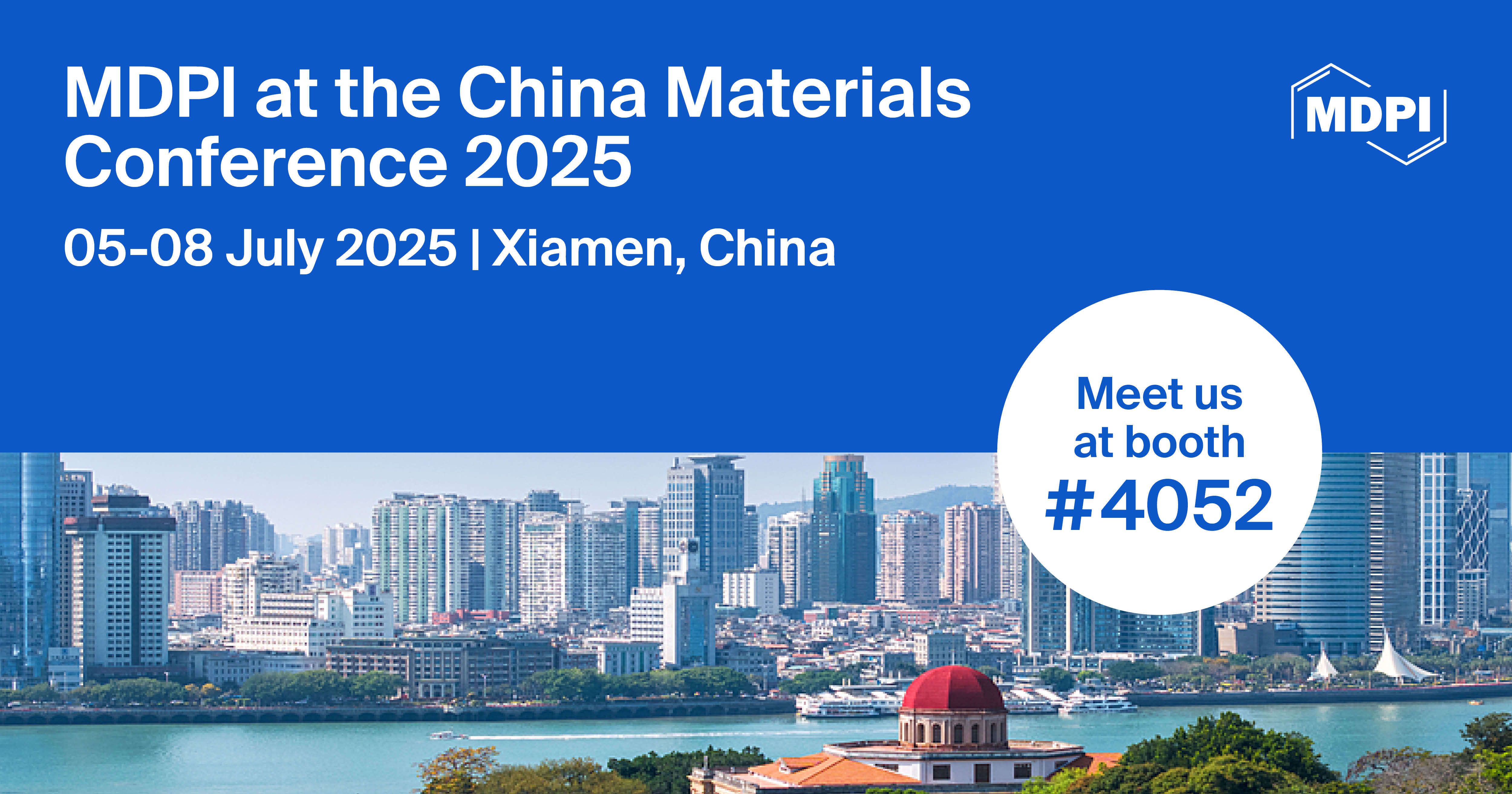
The China Materials Conference 2025 will be held from 5 to 8 July 2025, in Xiamen, China. The conference is organized by the China Materials Society.
Areas include the following:
- Energy materials;
- Environmental materials;
- Advanced structural materials;
- Functional materials;
- Material design, preparation and evaluation.
The following MDPI journals will be represented:
If you are attending this conference, please feel free to initiate an online conversation with us. Our delegates look forward to meeting you in person at booth #4052 and answering any questions that you may have. For more information about the conference, please visit the following link: https://cmc2025.scimeeting.cn/.
15 May 2025
Interview with Dr. Hiroyuki Ueda—Winner of the Batteries Outstanding Reviewer Award
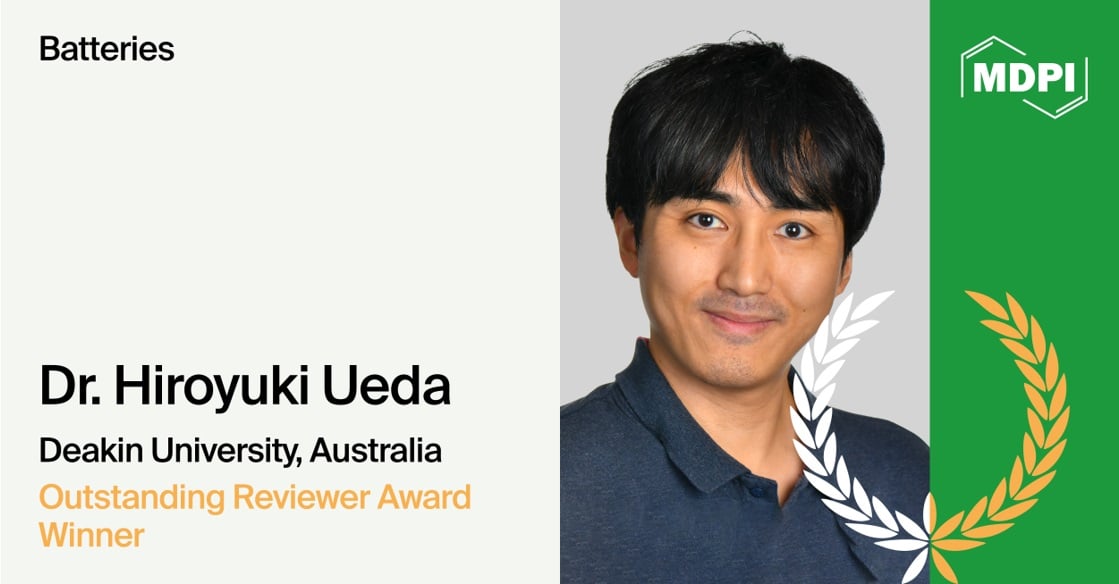
Name: Dr. Hiroyuki Ueda
Affiliations: 1 Institute for Frontier Materials (IFM), Deakin University, 221 Burwood Highway, Burwood, Victoria 3125, Australia; 2 Battery Research and Innovation Hub, Deakin University, 5/154 Highbury Road, Burwood, Victoria 3125, Australia
Research interests: electrochemistry, rechargeable batteries, solid-state batteries, ionic liquids, plastic crystals, solid electrolytes, electrode slurry preparation, slurry coating
Dr. Hiroyuki Ueda is an Alfred Deakin Postdoctoral Research Fellow at Deakin University. Dr. Ueda received his Ph.D. from Kumamoto University (Japan) and worked as a Battery Development Engineer in the industry for almost 4 years. Since 2020, he has led many industry collaborations. His current studies involve the use of advanced electrolytes and electrodes for battery applications, especially those dedicated to realizing practical solid-state batteries using plastic crystals as promising solid electrolytes.
The following is an interview with Dr. Hiroyuki Ueda:
1. Could you briefly introduce yourself to our readers and tell us a little bit about your fields of interest?
I am a passionate battery chemist with unique work experience in both academic and industry settings. My academic research career started in 2010 at Kumamoto University, under the supervision of Assoc. Prof. Soichiro Yoshimoto. I studied the electrochemistry of redox-active species at ionic liquid | gold single crystal interfaces and received a Ph.D. degree (Doctor of Engineering) in 2016. After graduation, I dived into the battery field; I was committed to many battery projects while I worked in the R&D centers of three companies in the chemical and automotive sectors. I moved back to academia in 2020 and have been working on multiple battery-related projects using solid-state analogs of ionic liquids called organic ionic plastic crystals at Deakin University for over 5 years.
My research interests include (i) the development of solid electrolyte membranes and composite electrodes (containing electrolytes before cell assembly) for solid-state batteries, (ii) the exploration of eco-friendly battery manufacturing without losing performance metrics, and (iii) the strategic accumulation of valuable experimental datasets that help clarify the correlation between a material’s structure or process parameters and an electrolyte’s, electrode’s, or battery’s properties to underpin our understanding of key factors to improve battery performance.
2. Could you elaborate on how you initially learned about the Batteries journal? Furthermore, what inspired you to apply for the Batteries Outstanding Reviewer Award 2024?
I believe the Batteries journal has become one of the well-known journals in the field of energy storage, and I was already aware of its strong reputation (especially for its rapid publication process), since I resumed my academic career in 2020. The Batteries journal has been listed as one of my candidate journals (with ideal intended readers) to which my research findings in the battery field can be submitted.
Because I knew that many senior researchers had commitments to peer reviews to support academic publication systems, I felt that participating in peer reviews would be a must-do as my career grows. I debuted as a peer reviewer for journals in 2022 after completing some online and in-person courses for those who need to be equipped with peer-review skills and ethics. Initially, I helped with some reviews for the journal for which my mentor served as a Senior Editor, which enabled me to gain actual peer-review experience and gradually intensified my willingness to contribute to peer-review processes for battery-focused manuscripts. Therefore, I applied to be a Volunteer Reviewer for Batteries in 2023. Since then, I have been exposed to many opportunities to engage in peer reviews of the latest findings in the battery field and tried to provide accurate, fast, and unbiased comments to help the decision-making process of submitted manuscripts, which I believe was fully recognized by the Selection Committee of the award.
3. Which research topics do you think will be of particular interest to the research community in the coming years?
I think the effective use of AI (typically machine learning) in material discovery and process optimization has gradually been playing a crucial role in the battery field. Batteries are very complicated devices, where engineering factors would govern performance rather than chemical factors alone; finding highly functional materials is a minimum requirement for the desired battery performance, but investigating how to make (and test) batteries using these materials is also important to leverage their full potential. We might need an unlimited amount of time to investigate all possible experimental conditions to decipher the material–process–property relationship of the resulting batteries thoroughly and, therefore, reliable data-driven approaches to shorten our time for experiments have been highly sought after to minimize labor and resources. I believe there will still be room for battery experts to make decisions (especially for slurry preparation steps), but I think it is worthwhile for R&D environments to flexibly and wisely exploit AI capabilities so that they can not only streamline many parameterized tasks but also cut out whole battery prototyping for probable dysfunctional compositions to improve their competitiveness in battery R&D.
4. What is your opinion of the open access model of publishing?
Personally, I like the open access model because it allows publications to reach a broader audience. This model often helped me; I was able to read scientific articles even though my employer did not have a subscription to a journal. Furthermore, downloading articles from open access journals just needs one click, which is quite convenient and time-saving, even when compared to the situation for subscribed non-open-access journals, because they usually require authentication before downloading articles.
However, I think the journal’s Editorial Office and invited reviewers for open access journals should diligently contribute to science development and establish a positive reputation within a relevant research community. Scientists know that the existence of so-called predatory journals and the open-access model is often at risk of being criticized as predatory because the journals would have a preference to accept as many papers as possible to gain their revenue without necessarily advancing science. To relieve this concern, I think open access journals need to be transparent about their peer-review and publication processes (i.e., how submitted manuscripts will be handled); editorial board members; and, for the authors and invited reviewers of the submitted manuscripts, how many reviewers are involved, their comments, and decision letters. The more authors and reviewers have a positive experience in the publication procedure and the impacts of published papers in open-access journals, the more the journals will be valuable in the research community, and their open access model will be successful.
5. What qualities do you think reviewers need? Do you have anything to say to other reviewers?
I believe accurate, fast, and unbiased reviews are preferable and truly help the journal’s decision-making process for science development. Reviewers need to leverage their expertise to request corrections about scientifically wrong, illogical, or misleading parts and to suggest room for improvement in submitted manuscripts. To provide accurate comments, reviewers should only accept an invitation for a manuscript in the area in which they are surely an expert. Even though a manuscript falls in their research area, if reviewers think they cannot commit to review within the journal’s standard review time, saying “No” (and suggesting alternative potential reviewers) to a review invitation is recommended. This helps rapid publication without holding manuscripts unnecessarily. Lastly, reviewers should not make their comments based on their positive or negative feelings toward a specific gender, race, or career stage where the author of a manuscript fits in. The science in the manuscript should be evaluated in an unbiased way. This means that submissions from well-known, highly reputable research groups are not a free pass to publications; reviewers need to find their value based on what is written there rather than the fame and past research contributions of the authors. On the other hand, submissions from authors that reviewers would not like should be equally evaluated; unfortunately, I have seen many unscientific overcriticisms because of this (e.g., unnecessarily asking English proofreading for authors from non-English-speaking countries, denying the quality of writing because the authors are graduate students without plenty of past publications, etc.). If reviewers notice a conflict of interest with the authors, they should not accept a review invitation. Also, the Editorial Office of a journal is responsible for removing unscientific overcriticisms (or asking reviewers to correct them) to establish a fair, comfortable review process for all parties.
6. What do you think are the main criteria that should be taken seriously in the process of reviewing manuscripts?
I think manuscripts should properly tell a story: what past studies in the focused field were, what research questions were, what methods the authors used to address them, and what the experimental results and their meanings in addressing the research questions were (plus, remaining issues and their possible countermeasures if necessary). Reviewers need to see if manuscripts deliver a clear story and if the presented data aligns well with it and should not unnecessarily request excellent performance metrics (e.g., rate and cycle performance of batteries) and additional characterizations that would not change the authors’ main findings. In this context, it is fine to present negative experimental results if they surely help form the story and readers can understand the reasons contributing to them; reviewers should not criticize the negative data only because of their appearance.
In addition, experimental procedures and reproducibility of experimental results should be properly explained in manuscripts. In the battery field, I often feel that some submitted manuscripts do not fully explain how electrodes were formulated and their details (e.g., size, composition, information about each ingredient, mass loading, density, porosity, etc.). Because these parameters affect the test results of batteries, the authors should be responsible for describing enough details. I think reviewers need to see if the experimental section delivers concise information about experiments so readers can replicate them in subsequent studies. On the other hand, I recommend ensuring reproducibility; for instance, because the test results of batteries vary from cell to cell, the authors are encouraged to provide how many cells per experimental condition were evaluated. If reviewers feel doubt about the reproducibility, they should ask the authors to clarify this point, which avoids publishing a misleading or actually wrong tendency of the data. These efforts underpin the dissemination of reliable information about scientific findings for research communities.
7. What is the secret to a happy scientific life? Have you ever encountered any difficulties conducting research and how did you overcome them?
I think the simplest secret is “Focusing on what YOU can change”. We can (mostly) control ourselves, but we cannot decide other people’s actions. Therefore, it is better to reduce the dependence of our short-term (e.g., daily) targets on what we cannot control. This helps make these targets more manageable and increases the likelihood of being satisfied with achievements. I think the same secret is applied to doing research; we might not have to set optimistic short-term targets (e.g., high performance metrics) because we do not know if our new experiments can deliver the expected results (which we cannot control). Instead, what we might need to do would be to set short-term targets that are less dependent on the quality or significance of data we generate (e.g., conducting three experiments and analyzing the factors that contribute to the results by a specified date). My friend said, “Data is data”, which is still in my mind as a useful, stress-free way of thinking. This encourages us to shift our focal point to discussions about what we can understand from data, which implies the next possible experiments or analyses. So far, I have faced many difficulties in research, but this approach has helped me a lot; a resilient, consistent, and step-by-step research commitment without feeling nervous about negative data surely filled gaps in answering research questions. In addition, it is important to develop our communication skills so that we can ask informal opinions about our research difficulties from more senior or expert researchers in a relevant field. This is because, sometimes, they already know the answers (especially if our difficulties are related to experimental methodology) or the approaches to help address the difficulties.
8. Do you have any advice for aspiring young researchers looking to make a meaningful impact in their respective fields?
I would say, “Follow the path you like intrinsically”. I think you would not be able to make a meaningful impact if you do not really like what you are doing right now; even if you get short-term satisfaction there, your vitality will run out eventually. This would be unscientific, but I presume our gut feelings might be true and often tell the path that we need to follow. If you like your research, you might be able to keep your motivation and consistently contribute to its progress. It is fine if the research that energizes you is away from hot topics, trends, or populated study areas; your continuous efforts will surely generate meaningful research outcomes, and someone will definitely recognize its value (as this happened to me). Therefore, keeping genuine motivation should come first before trying to make a meaningful impact.
First of all, thank you very much for selecting me for the Batteries Outstanding Reviewer Award. I am wholeheartedly honored to receive this prestigious award. I would like to express my sincere gratitude to my family members as well; they have supported my research career in various ways. Last but not least, I also thank my research group and employer, who gave me a space to dedicate myself to research.




















